




 |
 |
 |
 |
 |
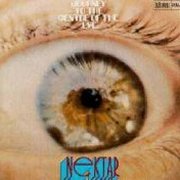 |
Journey to the Centre of the Eye (1971, 42.03) ****/TTT |
|
| Prelude Astronaut's Nightmare Countenance The Nine Lifeless Daughters of the Sun Warp Oversight The Dream Nebula The Dream Nebula Part II It's All in the Mind |
Burn Out My Eyes Void of Vision Pupil of the Eye Look Inside Yourself Death of the Mind |
|
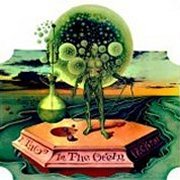 |
A Tab in the Ocean (1972, 35.54) ****½/TA Tab in the OceanDesolation Valley Waves Cryin' in the Dark King of Twilight |
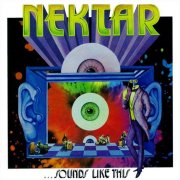 |
...Sounds Like This (1973, 74.19/150.31) ***/0 (½) |
||
| Good Day New Day Dawning What Ya Gonna Do? One-Two-Three-Four Do You Believe in Magic Cast Your Fate A Day in the Life of a Preacher Preacher Squeeze Mr. H |
Wings Odyssee Ron's on Never, Never, Never Da-Da-Dum [Expanded ed. adds: Good Day New Day Dawning Sunshine Down in the City Da Da Dum |
What Ya Gonna Do? It's All in Your Mind Cast Your Fate Jam Wings |
|
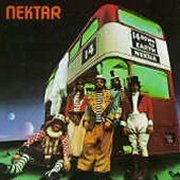 |
Down to Earth (1974, 37.08) **½/½Astral ManNelly the Elephant Early Morning Clown That's Life Fidgety Queen Oh Willy Little Boy Show Me the Way Finale |
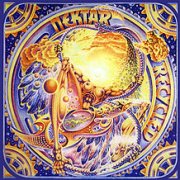 |
Recycled [Geoff Emerick mix] (2004, recorded 1975, 37.00) ****½/½ |
|
| Recycle Cybernetic Consumption Recycle Countdown Automaton Horrorscope Recycling Flight to Reality Unendless Imagination? São Paulo Sunrise |
Costa del Sol Marvellous Moses It's All Over |
|
Current availability:
Mellotrons used:
Nektar are often mistakenly lumped in with the German progressive scene, or, more bizarrely, 'Krautrock'. Although they formed in Hamburg, signed to the prestigious Bacillus label and recorded in Germany, they were all British, leaving them in an uneasy halfway house between the two countries, at least as far as this site's concerned.
Their debut, 1971's Journey to the Centre of the Eye, is proto-spacerock, featuring all the layers of delay effects and tripped-out lyrics that the emerging genre demanded. It tells the story of an astronaut intercepted by aliens and shown a better way to live. Or something. An obvious drug metaphor, the plot borrows heavily from Clarke/Kubrick's recently-released 2001: A Space Odyssey, although the lyrics can probably be dismissed, the music being the more important half of the equation. Keys man Allan "Taff" Freeman and bassist Derek "Mo" Moore both play Mellotron, with background strings on Countenance, upfront flutes and strings on It's All In The Mind, a solo flute part opening Burn Out My Eyes, a couple of string chords at the end of Void Of Vision and more flutes and strings on Look Inside Yourself and Death Of The Mind, finishing things off nicely. Nektar's next album, A Tab in the Ocean, blatantly continued the drug theme of its predecessor; the band have admitted that they found many of their ideas while tripping, this album's title being inspired by the idea of lacing the world's oceans with acid. Ahem. It's a great album in that spacerock/prog crossover region, especially the side-long title track, although the only Mellotron to be heard is an early-use choir part on closer King Of Twilight, a more straightforward rocker (relatively). Amusingly, it was covered on a b-side by Iron Maiden a decade later, showing their prog roots for all the world to see. I'd stick with the original, if I were you...
I'm afraid I've never been a great fan of their third release, the rather self-indulgent double ...Sounds Like This. Initial recordings were conducted live in the studio, in an attempt to recreate the band's live, jamming sound, combined with studio technology, much re-recording and overdubbing performed after the event. Unsurprisingly, the resulting album consists largely of jammed-out, er, jams, much of it rather formless, although better moments include parts of New Day Dawning (which, for some inexplicable reason, features a snippet of Norwegian Wood) and parts of Odyssee. Low points? The tiresome boogie of What Ya Gonna Do? and several rather cheesy songs (Good Day, One-Two-Three-Four) that find themselves extended way past their minimal content. There's no Mellotron on the original album, but Eclectic's two-disc reissue includes a slew of material from the original session, much of it the unedited first versions of final-version tracks. Somewhat surprisingly, a Mellotron (an M400) was present at the original session, used exceedingly sparingly, with distant choirs under the choruses of Good Day and equally distant ones on It's All In Your Mind.
Nektar went back to a more heavily-arranged style for the excellent Remember the Future (****½ - beware early CD issues), following that with the rather inessential Live at the Roundhouse. For their sixth album, Down to Earth, they dug out the Mellotron again, if barely, with naught but exceedingly background strings on Show Me The Way and, just possibly, Early Morning Clown; sadly, it's one of the worst albums of their career, carrying none of the band's sonic trademarks, based around a rather naff 'circus' concept for no particularly good reason. Hawkwind fans often obtain copies for Robert Calvert's cameo as the ringmaster, but, I have to say, the album as a whole is a great disappointment, its Mellotron use sparse and uninteresting.
Presumably recorded as a very public apology for Down to Earth, 1975's superb Recycled (in the days before that term became common parlance) returns, at least loosely, to Remember the Future's whole-LP concept, er, concept. Utilising Synergy's Larry Fast as an almost-fifth member, the album is a world away from their previous work, quite futuristic for the era, Fast's synth wizardry sounding more like the progressive bands of several years hence, not least UK and Saga. The material on side one is excellent, although the band lose their way slightly on the flip, knocking half a star from my rating; saying that, Marvellous Moses went on to be a live favourite, while nothing here comes even remotely close to plumbing the depths of its predecessor. Lyrically, the album was inspired by the band's first visit to America, where they noticed the conspicuous wastage that was soon to infest the rest of the world, giving them a theme for the record: environmentalism.
The album was originally mixed by The Beatles' engineer, Geoff Emerick (thanks to Mike for this one), although the band weren't entirely happy with the result, the actual release being a more synth-heavy version. During research undertaken for Eclectic/Dream Nebula's 2004 CD issue, Emerick's original mixes were unearthed and remastered as bonus tracks on the disc. The difference is obvious from the moment the album kicks off, with a longer tympani intro, while a sequencer part on Cybernetic Consumption becomes a high-speed bass run, the rest of the mix carrying on in a similar vein. Better? Worse? A matter of opinion, frankly; if I prefer the original, second mix, it has as much to do with familiarity as actual quality. Now, I simply can't tell whether Alan Moore's Mellotron on the original recordings is merely low in the mix, or mixed out altogether, but Emerick left it in, with decidedly audible strings (not to be confused with the ever-present string synth) on Cybernetic Consumption (albeit a mere four chords and a pitchbend), although, sadly, that appears to be our lot. Interestingly (well, I thought so), Moore's Hammond turns up in places on this version, too, although it's nowhere to be heard on the original.
After a twenty plus-year break, the mighty Nektar returned in the early 2000s, wowing them at NEARfest in 2002, their performance released as Greatest Hits Live, a.k.a. Live at the Patriots Theater. The first recorded fruit of their reformation is 2004's Evolution; sadly, it's pretty much what you'd expect: an AOR album with proggy touches. Opener Camouflage To White and The Debate are about the best things here, in a heavy-ish prog kind of way, while Child Of Mine (a slushy ballad) is about the worst, the remainder being a rather dated hard rock/AOR crossover thing. Believe me: this barely scrapes three stars.
Original keys man Allan "Taff" Freeman is credited with Mellotron, but the nearest this album comes to it is the string samples on a few tracks, notably Dancin' Into The Void, which could possibly be said to be Mellotron-derived at a pinch. Real Nektar devotees probably need to hear this album for its couple of decent tracks, but overall, it's something of a disappointment, I'm afraid. Still, better than 1980's Man in the Moon, eh?